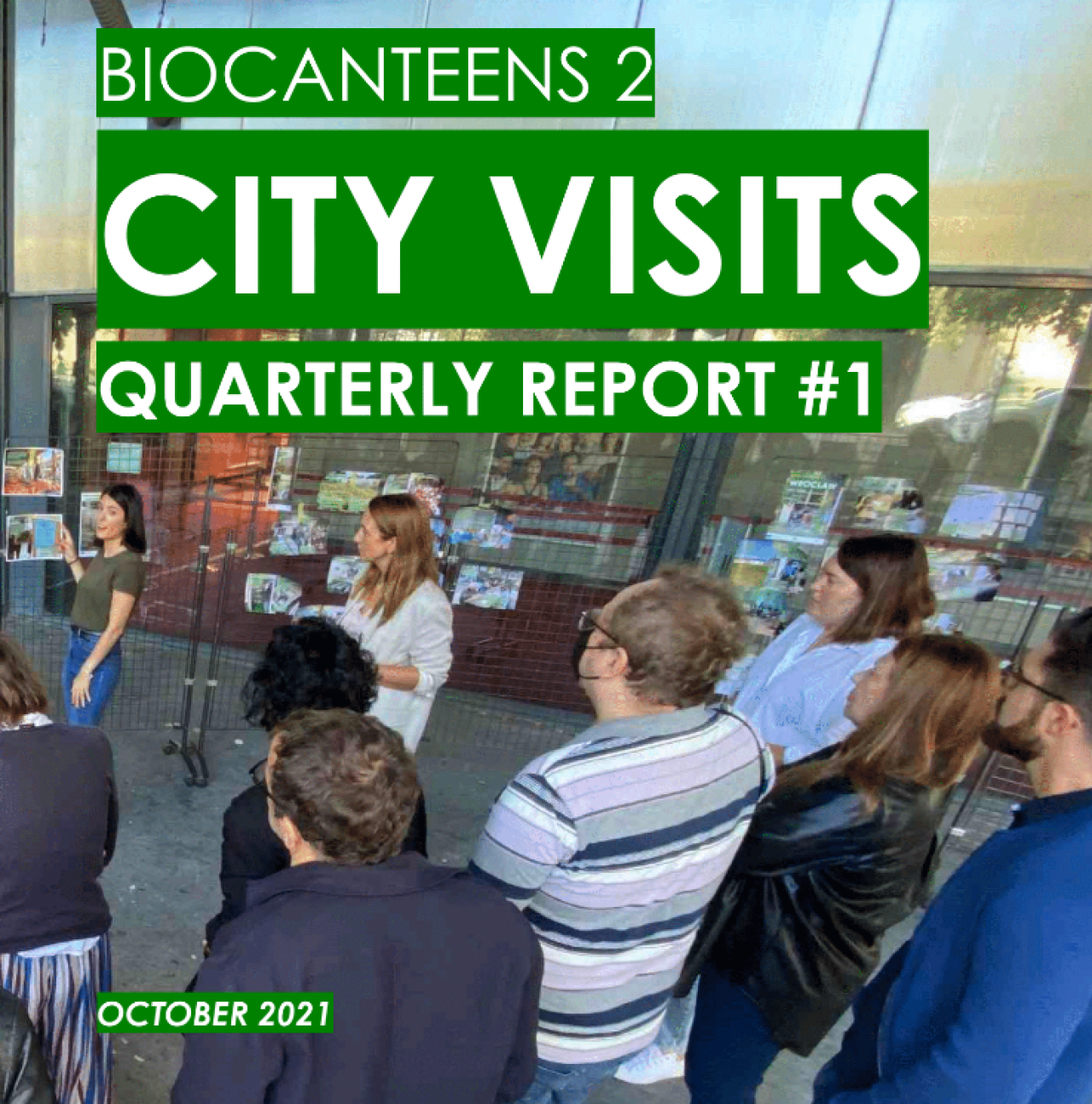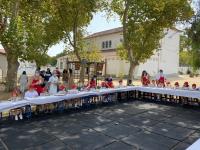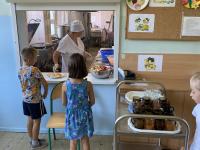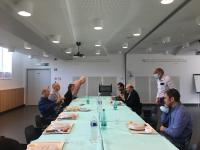
Between August and September, The Lead Partner's Team had the chance to visit the BioCanteens #2 Partners in their cities: Evora (PT), Wroclaw (PO), Gavà (ES), and Liège (BE). City Visits allowed us to get a bite of the reality of the territory, the political implication, the production and consumption patterns, and the functioning of the school procurement system. Most importantly, it gave us the chance to establish a relationship to perpetuate our fruitful collaboration for the next months.
With the following paragraphs, we want you to be part of our journey: sharing observations, places, and initiatives.
Evora, Portugal
Dates: 25th, 26th, 27th August 2021
Lead Partner Ambassador: Lead Expert, François Jegou

It is warm and sunny in Evora at the end of August when François Jegou, BioCanteens #2 Lead Expert, arrives. At about 100 km From Lisbon, this City of 57 000 inhabitants decided to embark on BioCanteens#2 Transfer Network. Rich of its vast surrounding rural area and the montado (agro-silvopastoral system), the city has a great potential for the production of organic food. The integration of this asset into a wider food policy plan is seen by the local team as an opportunity to build a local food project that can raise awareness on sustainability, create opportunities for best farming practices and improve the quality of food served in school canteens.
While given the possibility to visit one of the 4O school canteens, it was possible to have a look at the functioning of the kitchen and the staff work, which every day cooks between 200 and 400 meals from mostly fresh and raw ingredients. The preparation of meals already follows the seasonal cycle and pays particular attention to Alentejo’s gastronomic tradition. We have been guided to the fields of some local producers, who supply the schools with fruits and vegetables. What was great to notice is that 5 farmers of the area were consecrating a part of their production to schools, some of them conceiving this practice as a ‘’social engagement’’. Among those, one is organically certified, and from the interviews, it resulted that skepticism about certification is still widely diffused in the area.
"We need BioCanteens to help us better understand these issues and, be able to evolve our position” concludes the Deputy Mayor of Evora, Sara Fernandes. We have presented the initiatives already in place in Evora to sensitize citizens on ethical consumption, such as Horta das Pites and the Alto de s. Bento Museum Centre where pedagogic activities concerning botanics and composting take place regularly. The visit has been happily concluded and we kept in our mind the seeds of the progress towards a more sustainable and healthy food system for Portuguese schools.
Wroclaw, Poland
Dates: 8th -9th -10th September 2021
Lead Partner Ambassador: Lead Expert, François Jegou

Poland has never been so bright and luminous as the day the Wroclaw Partners welcomed François to his second City Visit. The doors opened to the main initiatives relevant and related to BioCanteens#2 project and a smooth and pleasant tour has been carried out for three days.
Our Visit started from the fascinating School Complex No. 3. This is an example where school vegetable and herb gardens were established, as part of the FOODSHIFT project, and where great attention is paid to gardening and floristic art. Workshops and educational classes help to shape pro-eco behavior from the early school years. In terms of school meals, this institution is not touched by BioCanteens#2 Practices though, which is the case for primary School and Nursery Unit No. 20 and Primary School No. 46, that we visited afterward. On this occasion, we had the chance to understand the diverse functioning of the school feeding systems in Wroclaw: The city hosts 53 primary schools, 24 schools, and kindergarten complexes, and 7 school complexes and special institutions behaving autonomously in terms of school meals preparation. This atomized system often hinders smooth organization and requires strong engagement for it to be harmonized.
Nonetheless, a first attempt to engage schools into transformation has been developed together with the University of Environmental and Life Sciences, as illustrated by Joanna Nyozak, Head of the city’s Health Office. A certification system with three levels has been designed with three classifying colors: bronze, silver, and gold. This enabled the city's canteens to catch up and be evaluated based on the quality of food served to kids.
But how to introduce organic and local food into schools, when organic production is not widely diffused in the surrounding? Our ambassador has been introduced to the only farmer present at the wholesale market of Targpiast with some familiarity with organic certification. We learned that organic needs and resources will need to be reinforced, starting from information and sensibilization.‘’The growing awareness of the importance of quality food for more than a decade is what will put pressure on the sector and on the actors involved to make the canteens change ‘’ concludes Michal Brotyna, local project coordinator. And in Wroclaw as well, awareness wakening initiatives are spreading all around and we finally got the occasion to see it for real.
Liège, Belgium
Dates: 13th - 14th September 2021
Lead Partner Ambassador : Lead Expert, François Jegou ; Deputy Mayor, Gilles Perole ; Project Coordinator, Clara Garrone

It happened by chance that in Liège almost all the project Responsibles from the Mouans-Sartoux side managed to participate in the City Visit. The whole team, from its technical, political, and managerial point of view could absorb Liège's engagement in food system transition and apport their inputs on multiple aspects. It all began with an agreeable meeting with the Mayor of the city, Mr. Willy Demeyer. At the round table, we had the pleasure to learn about the agenda of the city concerning food and the environment and the possible problems that we should take into account during the projects.
We learned about the main virtuous initiatives of the territory, notably the Ceinture Aliment-Terre Liegois (CATL), a network of food-related stakeholders promoting local food producers, sustainable and fair short supply chain. During the three days of the visit, we have allowed visit different initiatives of the CATL, such as the Community Supported Agriculture (CSA) of Les Champs De Possible, Les Pouces Poussants, and the Fairtrade organic grocery shop, Les Petits Producteurs, in the center of the city. The CATL is equally committed to transforming the school canteens system, and Florence Henrard, the pioneer of this movement, explained to us her efforts and demonstrated to us their willingness to walk hand in hand with BioCanteens#2 project.
For Public Schools, the City contracts with ISOSL public intercommunal company, for the preparation and delivery of hot and cold meals. ISOSL directly manages and organizes catering activities with its equipment and staff. It produces and supplies hospitals, nursing homes, schools, kindergartens, and home meals for a total of 2 000 meals per day. We visited and had lunch at the central building of ISOSL, discussing with the cooks and the managers the main difficulties faced. Among these, the nonobligatory of school meals in Belgium generates an irregular demand hard to be met without big amounts of waste and logistic difficulties.
City Stakeholders demonstrated to be highly motivated in BioCanteens Project and we had the chance to visit other partner institutes. The school of Horticulture, which hosted the last and numerous ULG meetings, is discussing how to partner with the Hotel Management School to allow products to circulate permeably from one context to the other.
How did this all conclude? A greatly participated meeting with local stakeholders and an interactive brainstorming session about the future objectives of BioCanteens#2.
Gavà
Dates: 15th, 16th September
Lead Partner Ambassador: Coordinator of the MEAD, Thibaud Lalanne

While a part of the delegation was still in Belgium, the Coordinator of the MEAD, Thibaud Lalanne, faced a troubled trip to reach Gavà, in the Metropolitan Area of Barcelona. With 47 057 inhabitants, Gavà has a fascinating landscape: close to the sea and the mountains, it is surrounded by a productive and agricultural-vacated belt. Food is now at the center of the municipality agenda and the opportunity to generate a sustainable food discourse starting from schools is the reason behind their partnership.
To a warm welcoming breakfast with the Mayor and the Deputy Mayor of the city, which has given a great introduction to the city engagement into food system transition and its vision of the project, following the visit the Baix Llobregat Agricultural Park and the Farmers’ Cooperative (Agropecuaria), created to protect and confederate local producers. Here, among the 20 farmers in Gavà, only one has organic certification. While walking around the colorful Farmers’ Market, it was explained that organic food is mainly devoted to export. For the moment, local consumers are not ready to pay a higher price for it. Nonetheless, Gavà is renowned for its strong gastronomic identity and the cultural promotion of local products (Feira des Asparragos).
On the second day, the local project Coordinators, accompanied by political representatives, showed the Marcel-li Moragas Primary School, which serves about 230 lunches per day. It was interesting to learn about the particular procurement System of the city. It is directly managed at the school level by Parents Associations (AFAs- Asociacion de Familias de Alumnos), which, in collaboration with school boards, are in charge of selecting and contracting external caterers. We understood that schools are still far from including a significant amount of organic products in school meals but « Families are willing to make changes and support the transition towards more sustainable meals but the main breaks are higher prices and administrative constraints » (Ana Garcia Damas, Municipal Technician).
After a tasty lunch at the Obrador dels Espigoladors, where cooks give a second life to unsold non-marketable food products for aesthetic standards, a ULG meeting has been organized to brainstorm about the first insights. Surrounded by the Neolithic stones of the Archeological Park, it has been smooth to recap the objectives of the project, the points of attention, and the expectations about the transformation of the school feeding system.
